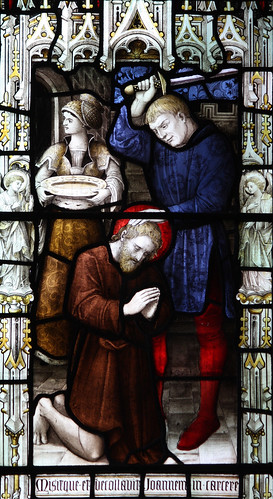Gospel Reading: John 5:1-3, 5-16
Today, St. John’s Gospel presents us with a miracle and a controversy. Miracles are controversial enough in themselves, but Jesus seems to be especially provocative in this encounter.
First: the miracle. The miracle takes place at the pool of Bethzatha (or Bethesda) on the outskirts of Jerusalem, near the Sheep Gate, which was on the North-Eastern section of the city wall. This is confirmed by a nineteenth century excavation in which the remains of the site described by St. John were discovered. The man who languished before Jesus is in a bad way. We are told he has been ill for thirty eight years, and the man’s protracted suffering is evident to Jesus. But what exactly is he doing at this pool? The explanation is given in passing and is also to be found in the absent latter part of verse 3 (3b) and verse 4, which the Editors omitted from the the New Vulgate and RSV due to their absence in earlier manuscripts. Though not part of the Bible, or today’s Gospel reading, the verses give some useful context: “...waiting for the moving of the water. [4] For an angel went down at a certain season into the pool, and troubled the water: whosoever then first after the troubling of the water stepped in, was made whole of whatever disease he had.” So the man was waiting to be healed, waiting to be the first one in the bubbling water but without anyone to help him in. One could be forgiven for thinking that his waiting would survive this episode - certainly, even the man himself seems sceptical of his chances. But he was desperate. He had no other hope, it seemed.
Confronted by this tragic scene, Our Lord takes pity. He heals him with the command: “Rise”. Now in so doing, Jesus had broken the law of the sabbath. This was not the first time he had done so (c.f. Luke 6:1-12). And Jesus does not stop there. After, “Rise” he continues, “take up your pallet, and walk”. In adding the first of these two additional instructions, Our Lord further contravenes the law of the sabbath since the carrying of one’s pallet was expressly forbidden.
Why? Why does Jesus break the law? He does so in order to provide a new understanding of the sabbath. The Catechism of the Catholic Church explains: “The Gospel reports many incidents when Jesus was accused of violating the sabbath law. But Jesus never fails to respect the holiness of this day. He gives this law its authentic and authoritative interpretation: ’The sabbath was made for man, not man for the sabbath.’ With compassion, Christ declares the sabbath for doing good rather than harm, for saving life rather than killing. The sabbath is the day of the Lord of mercies and a day to honor God. ‘The Son of Man is lord even of the sabbath’” (CCC 2173).
To this we might add some comment from St. Thomas Aquinas: “[Those Jews] in their desire to imitate God, did nothing on the sabbath, as if God on that day had ceased absolutely to act. It is true that he rested on the sabbath from his work of creating new creatures, but he is always continually at work, maintaining them in existence[...] God is the cause of all things in the sense that he also maintains them in existence; for if for one moment he were to stop exercising his power, at that very moment everything that nature contains would cease to exist” (Commentary on the Gospel of St. John, ad loc.) Thus immediately after today’s Gospel reading, Jesus says in his own words, “My Father is working still, and I am working” (v. 17).
Our Lord’s teaching in this passage is audacious, in that it challenged the Jewish conventions and provoked enmity; new, in that he provided a modified interpretation of the Sabbath - one that represented a significant departure from what preceded it; and true, in that as St. Thomas reflects, it is not as though God ceased to act at all on the sabbath, and likewise His Son, Jesus, did not cease to act when he met a child in need. In Jesus's teaching we find a profound lesson for ourselves. We may not work miracles, but we can act with charity - even when it seems awkward or somehow 'inappropriate'. Put crudely: love is a trump card, and we should play it whenever we can!
Our Lord’s teaching in this passage is audacious, in that it challenged the Jewish conventions and provoked enmity; new, in that he provided a modified interpretation of the Sabbath - one that represented a significant departure from what preceded it; and true, in that as St. Thomas reflects, it is not as though God ceased to act at all on the sabbath, and likewise His Son, Jesus, did not cease to act when he met a child in need. In Jesus's teaching we find a profound lesson for ourselves. We may not work miracles, but we can act with charity - even when it seems awkward or somehow 'inappropriate'. Put crudely: love is a trump card, and we should play it whenever we can!
Lord Jesus, grant us to see as you see. Prompt us to help those who are needy. Let us never withhold our charity out of misplaced obedience to convention.















